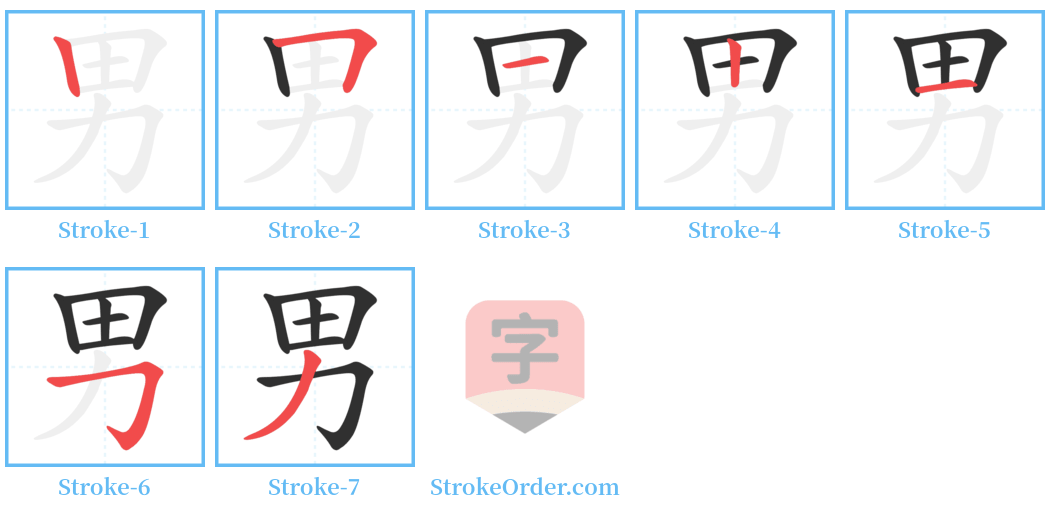男 Stroke Order
Animated Stroke Order of 男

Stroke Order Diagrams for 男

Step-by-Step Handwriting Guide for 男

Learn to Write Chinese Characters with Video Tutorials
Watch the video of writing the Chinese character "男", learn the correct stroke order (笔顺) of the character "男", and master the standard way of writing the character "男".
Free Printable Handwriting Practice with Stroke Order: 男
Printable Writing Practice Worksheet of "男" in Portrait Orientation (Tian Zi Ge)

Printable Writing Practice Worksheet of "男" in Landscape Orientation (Tian Zi Ge)

Information of 男
Pinyin
nán
Radical
田
Strokes
7 strokes
Usage
★★★★★
Definition
male
男 [nán]
1. A male person. (En: man)
2. Son. (En: boy; son)
3. A title of the fifth rank in the feudal system. (En: baron)
Definitions:
1. A male person: masculine individual, male child, equal rights between men and women.
2. Son: eldest son.
3. A title of the fifth rank in the feudal system: baron.
Origin:
- Original meaning: man, in contrast to "female."
- Character formation: ideographic, combining "field" and "strength;" represents the power used (sometimes referring to a plow) in farming.
Extended Meanings:
1. Same as the original meaning (En: man).
- Example from "Shuowen": 男, husband. From "male" and "strength," meaning men work hard in the field.
- Example from "Book of Songs": "boys were born."
- Example from "Book of Songs": "among many men."
- Example from Qing Dynasty: "men and women fled."
- Example from Jin Dynasty: "men and women dressed like outsiders."
- Example usage: men's responsibilities, adult males, men's clothing, education for boys, virtuous men, male authority.
2. Extended meaning referring to son. (En: boy; son)
- Example from Tang Dynasty: "three sons were stationed at Yecheng."
- Example: "one son sent a letter."
- Example: "one knows that boys are worse, while girls are preferred."
- Example from Jin Dynasty: "to give birth to a son is to have a male child."
- Example from "Book of Han": "two daughters and one son."
- Example usage: male flowers and female flowers (one male and half female; extended to refer to children); eldest son; second son; giving birth to boys and girls.
3. Refers to a son’s self-reference to his parents. (En: your son)
- Example from Lu Xun: "the son is recovering from an illness, and appetite is gradually returning."
4. A title of the fifth rank in the feudal system. (En: baron)
- Example from "Book of Rites": "the king's system of salaries and titles includes five ranks: duke, marquis, count, viscount, and baron."
behave like thieves and prostitutes / a thief if a man and a whore if a woman / (behave like) desperadoes and whores / men as robbers and women as prostitutes / The males are robbers and the females harlots -- to be out-and-out scoundrels.
Input Method for 男
Pinyin
nan2
Wubi
llb|ler
Cangjie
wks
Zhengma
kiym
Four Corner
60427
Unicode
U+7537
Same Pronunciation Characters